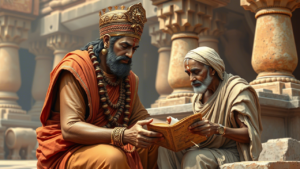Indians, deeply rooted in their rich cultural heritage, have played a significant role in contributing to the world in various ways. Their wisdom, traditions, and values, shaped by centuries of history, spirituality, and community living, offer valuable lessons and insights that continue to inspire and benefit humanity. Here’s a description of how older Indians, based on their culture, have helped the world:
1. Spiritual and Philosophical Wisdom
- Yoga and Meditation: Older Indians have preserved and passed down ancient practices like yoga and meditation, which are now globally recognized for promoting mental, physical, and spiritual well-being.
- Teachings of Compassion and Non-Violence: Inspired by figures like Mahatma Gandhi, older generations have shared the principles of ahimsa (non-violence) and karuna (compassion), influencing global movements for peace and justice.
2. Sustainable Living
- Eco-Friendly Practices: Traditional Indian culture emphasizes living in harmony with nature. Older Indians have practiced and promoted sustainable habits, such as using natural resources wisely, composting, and planting trees.
- Ayurveda and Natural Healing: The ancient system of Ayurveda, preserved by older generations, has gained global recognition for its holistic approach to health and wellness.
3. Family and Community Values
- Strong Family Bonds: Older Indians have upheld the importance of family and community, fostering a sense of belonging and support that serves as a model for social cohesion.
- Intergenerational Learning: They have played a key role in passing down cultural traditions, stories, and values to younger generations, ensuring the preservation of India’s rich heritage.
4. Art, Music, and Literature
- Cultural Preservation: Older Indians have been custodians of classical arts, such as Bharatanatyam, Kathak, Hindustani and Carnatic music, and traditional crafts, enriching global cultural diversity.
- Storytelling and Folklore: Through oral traditions, they have shared ancient epics like the Mahabharata and Ramayana, which offer timeless lessons on morality, duty, and human nature.
5. Resilience and Adaptability
- Surviving Challenges: Older Indians have lived through significant historical events, such as independence, partition, and economic changes, demonstrating resilience and adaptability that inspire others facing adversity.
- Balancing Tradition and Modernity: They have navigated the complexities of preserving cultural identity while embracing progress, offering a model for balancing tradition and change.
6. Philanthropy and Service
- Seva (Selfless Service): Many older Indians have dedicated their lives to serving others, inspired by the cultural value of seva. This spirit of giving has influenced charitable initiatives worldwide.
- Community Leadership: They have often taken on roles as mentors, teachers, and community leaders, guiding younger generations and contributing to societal development.
7. Culinary Contributions
- Indian Cuisine: Older Indians have preserved and shared the rich culinary traditions of India, introducing the world to diverse flavors, spices, and cooking techniques that have become globally beloved.
8. Global Influence
- Diaspora Contributions: Older Indians who migrated abroad have carried their cultural values and traditions with them, enriching multicultural societies and fostering cross-cultural understanding.
- Promoting Unity in Diversity: India’s cultural ethos of Vasudhaiva Kutumbakam (the world is one family) has been championed by older generations, promoting global unity and inclusivity.

